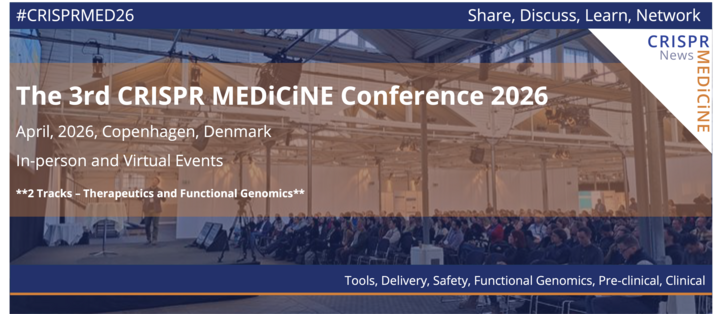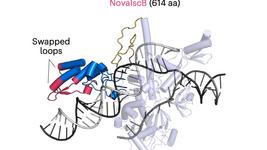CMN Weekly (17 July 2022) - Your Weekly CRISPR Medicine News
Do you plan to organise a webinar?
Why not use the CMN platform and get exposed to the global gene editing community.
More details here.
Top picks
- The Evolution of CRISPR Technology from Editing to Diagnostics. This feature in Inside Precision Medicine looks at some of the major advances within CRISPR-based diagnostics in the last 10 years.
- In a new study published in Science Advances this week, researchers from the Center for Regenerative Medicine at Boston Medical Center and Boston University School of Medicine report using CRISPR interference (CRISPRi) to understand the functions of nine genes that have been implicated in chronic obstructive pulmonary disease (COPD) through previous genome-wide association studies (GWAS). They used CRISPRi to silence these genes in induced pluripotent stem cell–derived type 2 alveolar epithelial cells (iAT2s) and found that multiple genes implicated by GWAS affect iAT2 function. They also found upon detailed characterisation of the GWAS gene DSP that it regulates iAT2 cell-cell junctions, proliferation, mitochondrial function, and response to cigarette smoke–induced injury. The authors suggest that their approach elucidates the biological function, as well as disease-relevant consequences of dysfunction, of genes implicated in COPD by GWAS in type 2 alveolar epithelial cells.
Research
- In an article published in Science Reports this week, researchers in the U.S. and Eygpt present CRISPR Del/Rei, a two-step deletion-reinsertion strategy with high editing efficiency and simple PCR-based screening that generates isogenic clones in approximately 2 months. The team apply their strategy to edit induced pluipotent stem cells at 3 loci with only rare off-target editing.
- Researchers in the U.S. have characterised type I-A CRISPR-Cas3 complexes and demonstrated their potential as effective nucleic acid detection and human genome-editing tools. The findings, which were recently published in Molecular Cell, demonstrate that unlike type 1 CRISPR-Cas systems that depend on a two-step process to cleave DNA, type I-A Cascade and Cas3 function as an integral effector complex. The team prepared four cryoelectron microscopy (cryo-EM) snapshots of the Pyrococcus furiosus (Pfu) type I-A effector complex in different stages of DNA recognition and degradation, and used the resulting mechanistic insights to engineer Pfu Cascade-Cas3 into a high-sensitivity, low-background, and temperature-activated nucleic acid detection tool that is also capable of robust bi-directional deletion-editing activity in human cells.
- In an article published in Nature Communications this week, scientists in Denmark, China and the U.S. introduce and describe the application of SURRO-seq, a high-throughput method for targeted in-cell capture of the off-targets of CRISPR RNA-guided nucleases (RGNs). The method is based on a pooled lentiviral vectors library encoding gRNA and barcoded surrogate off-target sites, to evaluate therapeutic RGN off-targets in cells.
- T cell exhaustion limits natural anti-tumour immunity, but the molecular mechanisms governing this process remain elusive. This week in Cancer Cell, researchers at various institutes in the U.S. report using genome-wide CRISPR-Cas9 screens to systematically discover regulators of T cell exhaustion, which identified an enrichment of epigenetic factors. Using in vivo CRISPR screens in murine and human tumour models, the team demonstrated that perturbation of the INO80 and BAF chromatin-remodelling complexes improved T cell persistence in tumours. The team also employed in vivo Perturb-seq to reveal distinct transcriptional roles of each complex and the consequence of depleting canonical BAF complex members. In summary, the findings provide an atlas of the genetic regulators of T cell exhaustion and show that chromatin remodelling can improve T cell responses in cancer immunotherapy.
- To better understand how RNA-guided DNA recognition activates Cas12a-mediated cleavage of a target strand (TS) following non-target-strand (NTS) cleavage, scientists in the UK have used single-molecule magnetic tweezers, gel-based assays and nanopore sequencing to explore DNA unwinding and cleavage. Their findings were published yesterday in Nature Chemical Biology.
- Researchers in the U.S. have developed Cas12a-Capture, a cost-effective and highly scalable method for targeted sequencing. The method utilises pre-programmed guide RNAs to direct CRISPR-Cas12a cleavage of double-stranded DNA in vitro and then exploits the resulting four to five nucleotide overhangs for selective ligation with a custom sequencing adapter. A targeted sequence library is finally prepared by the addition of a second sequencing adapter and enrichment for ligation products. To develop the new method, the team performed a pilot experiment with 7,176 guides targeting 3.5 Mb of DNA, and used the resulting data to model the sequence determinants of Cas12a-Capture efficiency, and then designed an optimised set of 11,438 guides targeting 3.0 Mb. The authors report that Cas12a-Capture variant calls had strong concordance with Illumina Platinum Genome calls and believe that the method has potential in a range of clinical and research applications. The findings were published in CRISPR Journal earlier this week.
- Scientists at the University of Tennessee (U.S.) have developed CASPER – 'CRISPR Associated Software for Pathway Engineering and Research' – which is a flexible platform software for gRNA generation and analysis in any organism and with any CRISPR-Cas system. The new tool combines traditional gRNA design tools with unique functions such as multiple Cas-type gRNA generation and evaluation of spacer redundancy in a single species or microbiome. The novel features of CASPER are packaged in a user-friendly interface to create a computational environment for researchers to streamline the utility of CRISPR-Cas systems. The findings were published in CRISPR Journal earlier this week.
- In a recent article in Cell Reports, researchers in China report that non-homologous end-joining (NHEJ)-mediated non-random editing profiles compensate the frameshift mutation in the Pcdh15 gene and restore the lost mechanotransduction function in postmitotic hair cells of Pcdh15av-3J mice, an animal model of human non-syndromic deafness DFNB23. The team found that the selected guide RNA, which was identified ex vivo in cultured cochlear explants, restored the reading frame in approximately 50% of indel products and recovered mechanotransduction in more than 70% of targeted hair cells. In vivo treatment led to improvements in auditory responses in half of the animals, and restoration in balance function in the majority of injected mutant mice. The authors propose that NHEJ-mediated reading-frame restoration is a simple and efficient strategy in post-mitotic systems.
Industry
- Vertex Pharmaceuticals announced this week that it is to acquire ViaCyte, with the goal of accelerating its potentially curative VX-880 programmes in type 1 diabetes (T1D). VX-880 is an allogeneic stem cell-derived, fully differentiated, insulin-producing islet cell therapy for T1D, and results from an ongoing Phase 1/2 study are so far promising. Read more in the press release from Vertex.
- Verve Therapeutics announced this week that it had dosed the first human in the heart-1 trial with its investigational in vivo base-editing therapy VERVE-101, as a potential treatment for heterozygous familial hypercholesterolemia. VERVE-101 is a novel, gene-editing therapeutic candidate designed as a single-course treatment that permanently switches off the PCSK9 gene in the liver to reduce disease-driving low-density lipoprotein cholesterol (LDL-C). You can read more about how VERVE-101 works in our recent clinical update here.
- Epic Bio, founded by CRISPR pioneer Stanley Qi, Ph.D launched this week with $55 million in Series A financing, with the goal to revolutionise genetic medicine with epigenetic engineering. The company is developing ultracompact therapies to act on the epigenome by modulating gene expression in vivo, and according to the company's press release, its lead programme in facioscapulohumeral muscular dystrophy (FSHD) is on track for clinical initiation in 2023.
Reviews
Fantastic AAV Gene Therapy Vectors and How to Find Them—Random Diversification, Rational Design and Machine Learning. The authors of this review provide an overview of the state-of-the-art approaches to create new adeno-associated virus (AAV) variants with higher specificity and efficiency of gene transfer in on-target cells. The review first looks at traditional and novel directed evolution approaches, including high-throughput screening of AAV capsid libraries, before moving to a discussion on programmable receptor-mediated targeting with a focus on two recent technologies that utilise high-affinity binders. Finally, the authors highlight machine learning as one of the latest strategies for rational AAV vector characterisation and optimisation, namely, which promises to facilitate and accelerate the identification of next-generation, safe and precise gene delivery vehicles.
News from CRISPR Medicine News
- For out latest CMN interview, we spoke with Subhash Pandey, Endowed Professor in the Department of Psychiatry and Director of the Alcohol Research Centre at the University of Illinois at Chicago. Subhash has been researching the effects of alcohol on the epigenome for several decades. His latest Science Advances study provides a causal link between adolescent alcohol exposure and epigenetic modifications at an enhancer region of synaptic gene Arc that lead to adult alcohol use disorder and anxiety. Read the interview here.
- Our latest webinar 'Multiplexed Genome Regulation In Vivo With Hyper-Efficient Cas12a' with Lucie Guo, MD PhD, Stanford University, USA is now available to watch on-demand. Watch it here.
To get more of the CRISPR Medicine News delivered to your inbox, sign up to the free weekly CMN Newsletter here.
Tags
CLINICAL TRIALS
Sponsors:
Poseida Therapeutics, Inc.







